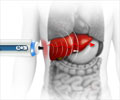Inflammation is not a contributing factor in the progression of liver fibrosis. This finding opens new avenues for targeted treatments.

Hepatic lipopolysaccharide binding protein partially uncouples inflammation from fibrosis in MAFLD
Go to source).
Controlling Liver Fibrosis is Key to Combatting Chronic Liver Disease
“Liver fibrosis is the critical feature that creates chronic liver disease and liver cancer. If we can keep fibrosis in check then we can meaningfully impact liver disease,” said Tamer Sallam, MD, corresponding author of the study and vice chair and associate professor in the department of medicine at the David Geffen School of Medicine at UCLA.‘Targeting inflammation might not reduce liver fibrosis in metabolic-associated fatty liver disease (#MAFLD), challenging longstanding beliefs. #fattyliverdisease #worldhepatitisdisease’





“For decades we have believed that targeting inflammation is one of the most important ways to reduce MAFLD. But this new research indicates that inflammation, while still important, may not be the main driver of fibrosis.” The study, published in the Journal of Clinical Investigation, looked specifically at a protein called lipopolysaccharide binding protein (LBP), which is involved in the body’s immune response, and how LBP functions in mice.
In addition to mouse models, the researchers also studied genetic analyses from large human datasets and human tissue samples from MAFLD patients at different stages in the disease, to examine the consequence of loss of LBP function. The evidence combined showed that the LBP does not alter scar tissue markers.
Sallam indicated a need to further explore how LBP influences inflammation and whether other factors can offer a more potent reduction in inflammation and have an impact on reducing fibrosis.
“Reducing scar burden is one of the holy grails in the treatment of advanced liver diseases,” Sallam said. “These results suggest that certain ways of targeting inflammation may not be a viable option and that more directed therapies against other pathways could help us better target fibrosis and improve outcomes for patients.”
Advertisement
- Hepatic lipopolysaccharide binding protein partially uncouples inflammation from fibrosis in MAFLD - (https://www.jci.org/articles/view/179752)















